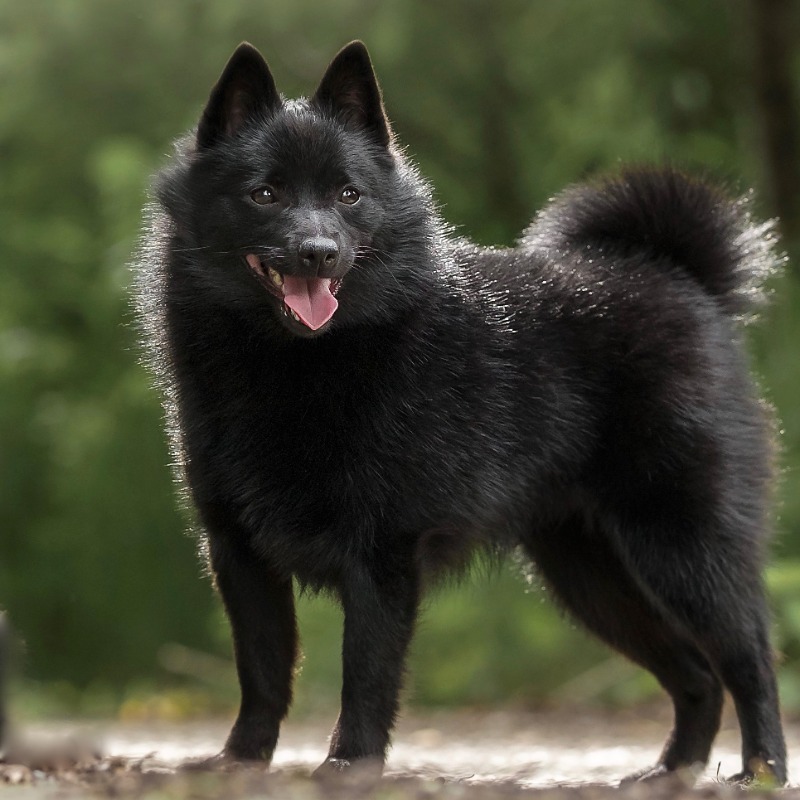Breeds
Schipperke

GROUP 7 - NON SPORTING
Brief History
The loyal and intelligent Schipperke originated in Belgium as a small version of a black Belgian sheepdog known as the Leauvenaar. The name Schipperke is thought to have come from a word meaning "little shepherd," but the dogs were best known for guarding the boats that plied the canals between Brussels and Antwerp.
Average Life Span
When considering a dog, please realise that you are taking it on for its lifetime. The average life span is 12 to 14 years.
Temperament
A Schipperke should be active, intensively lively and alert, and its temperament should be amenable, intelligent and faithful. Schipperke are strongly loyal to their family but often distrustful of strangers. Schipperke are extremely curious dogs, inspecting every inch of the house and objecting to anything out of order, like moved furniture. When you have their attention, their ears will be at the alert and they will twist their heads from side to side with a quizzical look. They eat swiftly, and food treats will hold their attention. They are instinctively efficient killers of rats and other vermin. Schipperke are wonderful travellers, having started with the horse and carriage and graduated to the automobile.
General Breed Description
Schipperke are small, cobby dogs with a sharp, foxy expression. Their eyes should be dark brown. Coats are usually black but occasionally other whole colours. The coats should be harsh and have a frill and a mane, and good culottes on the back of the thighs. Feet should be cat-like. A Schipperke can be walked several kilometres a day, but will be equally content spending a day in the backyard. Schipperke are very intelligent dogs and this needs to be considered when planning their training and housing. Schipperke don’t have a "doggy odour". This breed can have a natural bob tail.
Coat and Care requirements
Abundant, dense and harsh; smooth on head, ears and legs; lying close on back and side; erect and thick round neck, forming a mane and frill; with good culottes on the back of thighs. This breed requires regular brushing and bathing.
Size
Weight: 5.5 to 7.5kgs (12-16lbs)
Health
All breeds have individual health issues. When speaking to breeders in is recommended you enquire about breed health and what health testing the breeder does. The Schipperke is generally a healthy breed, however health conditions do occur occasionally.
Suitability
Anyone who is captured by the nature and appearance of the Schipperke, and who can meet his needs as described above, would make a good owner. Families, elderly people and those with small yards may be especially attracted to the Schipperke. This observation is not intended to rule out people who don’t fit into these groups.
In Conclusion
Now you know a little more about this breed. If you have decided this is the dog for you and wish to investigate further, please contact the Breed Club or Dogs Victoria. They will be able to give you information about available puppies and also suggest dog events where you can see the breed and speak to breeders. In this way you will gain a better perspective of the breed and its needs. With any breed of dog, it is important to research and determine suitability for your lifestyle before committing to a puppy which will be a part of your family for many years to come.
Whilst many breeds are recommended for families, it is imperative that when children are with dogs they are supervised at all times. Basic obedience training is a vital part of dog ownership.
Dogs Victoria is about the responsible ownership of all dogs and in particular the preservation of pure breeds.
Link to Dogs Australia Breed Standard: https://dogsaustralia.org.au/breed/detail/92
Breeders




